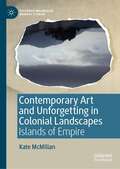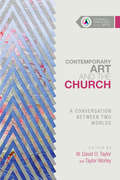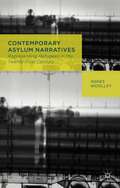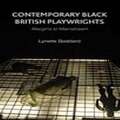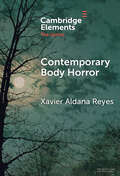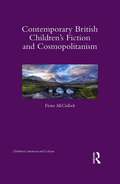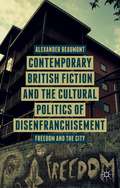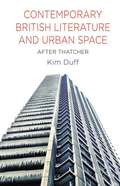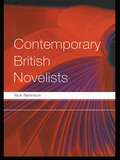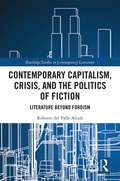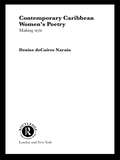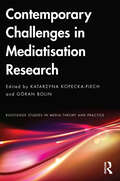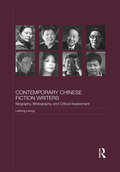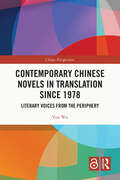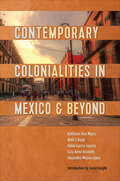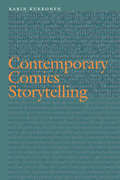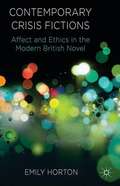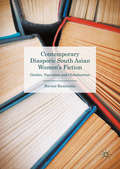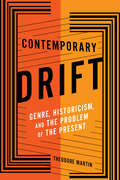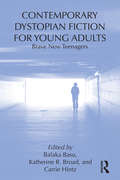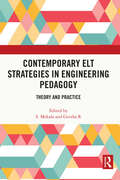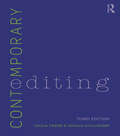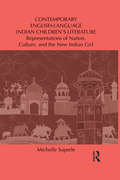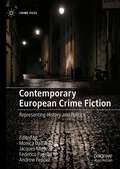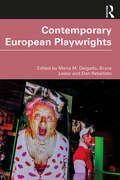- Table View
- List View
Contemporary Art and Unforgetting in Colonial Landscapes: Islands of Empire (Palgrave Macmillan Memory Studies)
by Kate McMillanThis book explores the work of artists based in the global south whose practices and methods interrogate and explore the residue of Empire. In doing so, it highlights the way that contemporary art can assist in the un-forgetting of colonial violence and oppression that has been systemically minimized. The research draws from various fields including memory studies; postcolonial and decolonial strategies of resistance; activism; theories of the global south; the intersection between colonialism and the Anthropocene, as well as practice-led research methodologies in the visual arts. Told through the author’s own perspective as an artist and examining the work of Julie Gough, Yuki Kihara, Megan Cope, Yhonnie Scarce, Lisa Reihana and Karla Dickens, the book develops a number of unique theories for configuring the relationship between art and a troubled past.
Contemporary Art and the Church: A Conversation Between Two Worlds (Studies in Theology and the Arts)
by W. David Taylor Taylor WorleyContemporary Art and the Church
Contemporary Asylum Narratives
by Agnes WoolleyContemporary Asylum Narratives marks a transition from traditional modes of diasporic belonging to the need for identifications that encompass the statelessness of refugees and asylum seekers. This book explores representations of asylum seekers and refugees in twenty-first century literature, film and theatre.
Contemporary Black British Playwrights
by Lynette GoddardThis book examines the socio-political and theatrical conditions that heralded the shift from the margins to the mainstream for black British Writers, through analysis of the social issues portrayed in plays by Kwame Kwei-Armah, debbie tucker green, Roy Williams, and Bola Agbaje.
Contemporary Body Horror (Elements in the Gothic)
by Xavier Aldana Reyes'Body horror', a horror subgenre concerned with transformation, loss of control and the human body's susceptibility to disease, infection and external harm, has moved into the mainstream to become one of the greatest repositories of biopolitical discourse. Put simply, body horror acts out the power flows of modern life, visualising often imperceptible or ignored processes of marginalisation and behavioural policing, and revealing how interrelations between different social spheres (medical, legal, political, educational) produce embodied identity. This book offers the first sustained study of the types of body horror that have been popular in the twenty-first century and centres on the representational and ideological work they carry out. It proposes that, thanks to the progressive vision of feminist, queer and anti-racist practitioners, this important subgenre has expanded its ethical horizons and even found a sense of celebratory liberation in fantastic metamorphoses redolent of contemporary activist movements.
Contemporary British Children's Fiction and Cosmopolitanism (Children's Literature and Culture)
by Fiona McCullochThis book visits contemporary British children’s and young adult (YA) fiction alongside cosmopolitanism, exploring the notion of the nation within the context of globalization, transnationalism and citizenship. By resisting globalization’s dehumanizing conflation, cosmopolitanism offers an ethical, humanitarian, and political outlook of convivial planetary community. In its pedagogical responsibility towards readers who will become future citizens, contemporary children’s and YA fiction seeks to interrogate and dismantle modes of difference and instead provide aspirational models of empathetic world citizenship. McCulloch discusses texts such as J.K. Rowling’s Harry Potter series, Jackie Kay’s Strawgirl, Theresa Breslin’s Divided City, Gillian Cross’s Where I Belong, Kerry Drewery’s A Brighter Fear, Saci Lloyd’s Momentum, and Julie Bertagna’s Exodus trilogy. This book addresses ways in which children’s and YA fiction imagines not only the nation but the world beyond, seeking to disrupt binary divisions through a cosmopolitical outlook. The writers discussed envision British society’s position and role within a global arena of wide-ranging topical issues, including global conflicts, gender, racial politics, ecology, and climate change. Contemporary children’s fiction has matured by depicting characters who face uncertainty just as the world itself experiences an uncertain future of global risks, such as environmental threats and terrorism. The volume will be of significant interest to the fields of children’s literature, YA fiction, contemporary fiction, cosmopolitanism, ecofeminism, gender theory, and British and Scottish literature.
Contemporary British Fiction and the Cultural Politics of Disenfranchisement
by Alexander BeaumontDuring the 1980s, urban space became an important battleground in a confrontation between left and right over the meaning of freedom. While Thatcherism sought to harness the power of the free market to rationalise and reform the inner cities, the response of the 'cultural' left was to celebrate the emancipatory potential of flexible identities and expressive practices associated with urban subcultures. However, through close readings of eight contemporary authors, this book argues that a problematic consequence of the left's experiment with freedom was to elevate exclusion to the status of a political principle and to close down the space of politics itself. It explores how, in less than two decades, the coexistence of flexible cultural identities and urban space has become a virtual impossibility in British fiction. And it suggests that, today, the British novel is frequently marked by structures of failed utopianism, frustrated or incomplete experiments and even withdrawal and quietism, all of which are a consequence of the left's celebration of a cultural politics of disenfranchisement.
Contemporary British Literature and Urban Space
by Kim DuffLooking at writers such as Will Self, Hani Kureishi, JG Ballard, and Iain Sinclair, Kim Duff's new book examines contemporary British literature and its depiction of the city after the time of Thatcher and mass privatization. This lively study is an important and engaging work for students and scholars alike.
Contemporary British Novelists (Routledge Key Guides)
by Nick RennisonFeaturing a broad range of contemporary British novelists from Iain Banks to Jeanette Winterson, Louis de Bernieres to Irvine Welsh and Salman Rushdie, this book offers an excellent introductory guide to the contemporary literary scene. Each entry includes concise biographical information on each of the key novelists and analysis of their major works and themes. Fully cross-referenced and containing extensive guides to further reading, Fifty Contemporary British Novelists is the ideal guide to modern British fiction for both the student and the contemporary fiction buff alike.
Contemporary Capitalism, Crisis, and the Politics of Fiction: Literature Beyond Fordism (Routledge Studies in Contemporary Literature)
by Roberto del Valle AlcaláContemporary Capitalism, Crisis, and the Politics of Fiction: Literature Beyond Fordism proposes a fresh approach to contemporary fictional engagements with the idea of crisis in capitalism and its various social and economic manifestations. The book investigates how late-twentieth and twenty-first-century Anglophone fiction has imagined, interpreted, and in most cases resisted, the collapse of the socio-economic structures built after the Second World War and their replacement with a presumably immaterial order of finance-led economic development. Through a series of detailed readings of the words of authors Martin Amis, Hari Kunzru, Don DeLillo, Zia Haider Rahman, John Lanchester, Paul Murray and Zadie Smith among others, this study sheds light on the embattled and decidedly unstable nature of contemporary capitalism.
Contemporary Caribbean Women's Poetry: Making Style (Routledge Research in Postcolonial Literatures)
by Denise deCaires NarainContemporary Caribbean Women's Poetry provides detailed readings of individual poems by women poets whose work has not yet received the sustained critical attention it deserves. These readings are contextualized both within Caribbean cultural debates and postcolonial and feminist critical discourses in a lively and engaged way; revisiting nationalist debates as well as topical issues about the performance of gendered and raced identities within poetic discourse. Newly available in paperback, this book is groundbreaking reading for all those interested in postcolonialism, Gender Studies, Caribbean Studies and contemporary poetry.
Contemporary Challenges in Mediatisation Research (Routledge Studies in Media Theory and Practice)
by Katarzyna Kopecka-PiechThis book focuses on key challenges related to conducting research on mediatisation, presenting the most current theoretical, empirical, and methodological challenges and problems, addressing ignored and less frequently discussed topics, critical and controversial themes, and defining niches and directions of development in mediatisation. With a focus on the under-representation of certain topics and aspects, as well as methodological, technological, and ethical dilemmas, the chapters consider the main critical objections formulated against mediatisation studies and exchange critical positions. Moving beyond areas of common focus – culture, sport, and religion – to emerging areas of study such as fashion, the military, business, and the environment, the book then offers a critical assessment of the transformation of fields and the relevance of new and dynamic (meta)processes including datafication, counter-mediatisation, and platformisation. Charting new paths of development in mediatisation, this book will be of interest to scholars and students of mediatisation, media studies, media literacy, communication studies, and research methods.
Contemporary Chinese Fiction Writers: Biography, Bibliography, and Critical Assessment
by Laifong LeungIn the years since the death of Mao Zedong, interest in Chinese writers and Chinese literature has risen significantly in the West. In 2000, Gao Xingjian became the first Chinese writer to receive the Nobel Prize for Literature followed by Mo Yan in 2012, and writers such as Ha Jin and Da Sijie have also become well known in the West. Despite this progress, the vast majority of Chinese writers remain largely unknown outside of China. This book introduces the lives and works of eighty contemporary Chinese writers, and focuses on writers from the "Rightist" generation (Bai Hua, Gao Xiaosheng, Liu Shaotang), writers of the Red Guard generation (Li Rui, Wang Anyi), Post-Cultural Revolution Writers, as well as others. Unlike earlier works, it provides detailed, often first-hand, biographical information on this wide range of writers, including their career trajectories, major themes and artistic characteristics. In addition to this, each entry includes a critical presentation and evaluation of the writer’s major works, a selected bibliography of publications that includes works in Chinese, works translated into English, and critical articles and books available in English. Offering a valuable contribution to the field of contemporary Chinese literature by making detailed information about Chinese writers more accessible, this book will be of interest to students and scholars Chinese Literature, Contemporary Literature and Chinese Studies.
Contemporary Chinese Novels in Translation since 1978: Literary Voices from the Periphery (ISSN)
by Yun WuThis book aims to complement the traditional focus of translation studies, which has primarily centered on translating English into other languages. It presents a comprehensive analysis of the reverse translation trajectory, exploring the movement of Chinese literature into the core English literary domain.The book aims to explore the ideological and sociological dynamics that underlie the translation of contemporary Chinese novels. This is achieved through an examination of the translation selection process, translation paratexts, and the roles of translation agents. Case studies are employed to illustrate specific linguistic, literary, and cultural challenges within translation. It dissects the cultural and literary implications of translating genres such as women's writing, science fiction, and Internet literature. The argument presented is that the translation of peripheral literature is indispensable in shaping global literature. Beyond its literary implications, the book identifies the political significance inherent in such reverse translation endeavors. It suggests that the translation of Chinese literature holds notable political interest for the Chinese government, which aims to reshape China's image and bolster the nation's soft power through literary translation.This work will be an essential read to students and scholars of translation studies, comparative literature, and Chinese studies.
Contemporary Colonialities in Mexico and Beyond (LATINOAMERICANA)
by Kathleen Myers Pablo García Loaeza Beth Boyd Cara Kinnally Alejandro Mejías-LópezContemporary Colonialities in Mexico and Beyond explores the changing dynamic of coloniality by focusing on how modern cultural products connect to the foundational structures of colonialism. The book examines how these structures have perpetuated discourses of racial, ethnic, gender, and social exclusion rooted in Mexico’s history. Given the intimate relationship between coloniality and modernity, the volume addresses three central questions: How does the Mexican colonial history influence the definition of Mexico from within and outside its borders? What issues rooted in coloniality recur over time and space? And finally, how do cultural products provide a concrete and tangible way of studying coloniality, its history, and its evolution? The book analyses how literary works, movies, television series, and social media posts reconfigure colonial difference and spatialization. Supported by careful historical and cultural contextualization, these analyses will allow readers to appreciate contemporary Mexico vis-à-vis culture and borderland issues in the United States and debates on imperial memory in Spain. Ultimately, Contemporary Colonialities in Mexico and Beyond presents a handbook for readers looking to learn more about coloniality as a pervasive part of global interactions today.
Contemporary Comics Storytelling (Frontiers of Narrative)
by Karin KukkonenWhat if fairy-tale characters lived in New York City? What if a superhero knew he was a fictional character? What if you could dispense your own justice with one hundred untraceable bullets? These are the questions asked and answered in the course of the challenging storytelling in Fables, Tom Strong, and 100 Bullets, the three twenty-first-century comics series that Karin Kukkonen considers in depth in her exploration of how and why the storytelling in comics is more than merely entertaining.Applying a cognitive approach to reading comics in all their narrative richness and intricacy, Contemporary Comics Storytelling opens an intriguing perspective on how these works engage the legacy of postmodernism—its subversion, self-reflexivity, and moral contingency. Its three case studies trace how contemporary comics tie into deep traditions of visual and verbal storytelling, how they reevaluate their own status as fiction, and how the fictional minds of their characters generate complex ethical thought experiments. At a time when the medium is taken more and more seriously as intricate and compelling literary art, this book lays the groundwork for an analysis of the ways in which comics challenge and engage readers&’ minds. It brings together comics studies with narratology and literary criticism and, in so doing, provides a new set of tools for evaluating the graphic novel as an emergent literary form.
Contemporary Crisis Fictions
by Emily HortonThis book offers a significant statement about the contemporary British novel in relation to three authors: Graham Swift, Ian McEwan, and Kazuo Ishiguro. All writing at the forefront of a generation, these authors sought to resuscitate the novel's ethico-political credentials, at a time which did not seem conducive to such a project.
Contemporary Diasporic South Asian Women's Fiction: Gender, Narration and Globalisation
by Ruvani RanasinhaThis book is the first comparative analysis of a new generation of diasporic Anglophone South Asian women novelists including Kiran Desai, Tahmima Anam, Monica Ali, Kamila Shamsie and Jhumpa Lahiri from a feminist perspective. It charts the significant changes these writers have produced in postcolonial and contemporary women's fiction since the late 1990s. Paying careful attention to the authors' distinct subcontinental backgrounds of Pakistan, Bangladesh and Sri Lanka - as well as India - this study destabilises the central place given to fiction focused on India. It broadens the customary focus on diasporic writers' metropolitan contexts, illuminates how these transnational, female-authored literary texts challenge national assumptions and considers the ways in which this new configuration of transnational, feminist writers produces a postcolonial feminist discourse, which differs from Anglo-American feminism.
Contemporary Drift: Genre, Historicism, and the Problem of the Present (Literature Now)
by Theodore MartinWhat does it mean to call something “contemporary”? More than simply denoting what’s new, it speaks to how we come to know the present we’re living in and how we develop a shared story about it. The story of trying to understand the present is an integral, yet often unnoticed, part of the literature and film of our moment. In Contemporary Drift, Theodore Martin argues that the contemporary is not just a historical period but also a conceptual problem, and he claims that contemporary genre fiction offers a much-needed resource for resolving that problem.Contemporary Drift combines a theoretical focus on the challenge of conceptualizing the present with a historical account of contemporary literature and film. Emphasizing both the difficulty and the necessity of historicizing the contemporary, the book explores how recent works of fiction depict life in an age of global capitalism, postindustrialism, and climate change. Through new histories of the novel of manners, film noir, the Western, detective fiction, and the postapocalyptic novel, Martin shows how the problem of the contemporary preoccupies a wide range of novelists and filmmakers, including Zadie Smith, Colson Whitehead, Vikram Chandra, China Miéville, Kelly Reichardt, and the Coen brothers. Martin argues that genre provides these artists with a formal strategy for understanding both the content and the concept of the contemporary. Genre writing, with its mix of old and new, brings to light the complicated process by which we make sense of our present and determine what belongs to our time.
Contemporary Dystopian Fiction for Young Adults: Brave New Teenagers (Children's Literature and Culture)
by Carrie Hintz Balaka Basu Katherine R. BroadWinner of the Children’s Literature Association Edited Book Award From the jaded, wired teenagers of M.T. Anderson's Feed to the spirited young rebels of Suzanne Collins’ The Hunger Games trilogy, the protagonists of Young Adult dystopias are introducing a new generation of readers to the pleasures and challenges of dystopian imaginings. As the dark universes of YA dystopias continue to flood the market,Contemporary Dystopian Fiction for Young Adults: Brave New Teenagers offers a critical evaluation of the literary and political potentials of this widespread publishing phenomenon. With its capacity to frighten and warn, dystopian writing powerfully engages with our pressing global concerns: liberty and self-determination, environmental destruction and looming catastrophe, questions of identity and justice, and the increasingly fragile boundaries between technology and the self. When directed at young readers, these dystopian warnings are distilled into exciting adventures with gripping plots and accessible messages that may have the potential to motivate a generation on the cusp of adulthood. This collection enacts a lively debate about the goals and efficacy of YA dystopias, with three major areas of contention: do these texts reinscribe an old didacticism or offer an exciting new frontier in children's literature? Do their political critiques represent conservative or radical ideologies? And finally, are these novels high-minded attempts to educate the young or simply bids to cash in on a formula for commercial success? This collection represents a prismatic and evolving understanding of the genre, illuminating its relevance to children's literature and our wider culture.
Contemporary ELT Strategies in Engineering Pedagogy: Theory and Practice
by S. Mekala and Geetha RThis book explores innovative pedagogical practices and teaching and learning strategies in the engineering curriculum for empowered learning. It highlights the urgency for developing specific skill sets among students that meet the current market recruitment needs. The authors present a detailed framework for fostering a higher level of competence in students especially in their communication skills, their knowledge of media and technology tools, and their leadership skills. The book offers examples of new and effective teaching strategies including cognitive, metacognitive, and socio-affective strategies which align well with the existing and evolving technical curriculum. The book will be of interest to teachers, students, and researchers of education, engineering, and higher education. It will also be useful for English language teachers, educators, and curriculum developers.
Contemporary Editing
by Cecilia Friend Don ChallengerContemporary Editing offers journalism students a forward-looking introduction to news editing, providing instruction on traditional newsroom conventions along with a focus on emerging news platforms. This comprehensive text provides students with a strong understanding of everything an editor does, addressing essential copy editing fundamentals such as grammar and style; editorial decision making; photo editing, information graphics, and page design; and new media approaches to storytelling. Throughout, the book focuses on how "the editor’s attitude"—a keen awareness of news values, ethics, and audience—comes into play in all facets of news editing. This new edition offers expanded coverage of web publishing and mobile media, giving students solid editing skills for today’s evolving media and news forums. Features of the Third Edition: -Editing 2.0 boxes discuss the impact of digital technology and social media on editing. -Coverage of grammar problems and a new chapter on working with numbers provide students with a strong grasp of math and grammar, which are the underpinnings for all writing and editing. -An emphasis on editing for brevity prepares students to write and edit clearly and briefly, for print and for the web. -A chapter on the art of headline writing guides students through one of the editor’s most important tasks, and introduces the task of search engine optimization. -Examples of ethics and legal situations show students how issues arise in even the most basic stories, and how to address them. -Online exercises present additional practice for students, without needing to purchase a workbook. ? ?
Contemporary English-Language Indian Children's Literature: Representations of Nation, Culture, and the New Indian Girl (Children's Literature and Culture)
by Michelle SuperleConcurrent with increasing scholarly attention toward national children’s literatures, Contemporary English-language Indian Children’s Literature explores an emerging body of work that has thus far garnered little serious critical attention. Superle critically examines the ways Indian children’s writers have represented childhood in relation to the Indian nation, Indian cultural identity, and Indian girlhood. From a framework of postcolonial and feminist theories, children’s novels published between 1988 and 2008 in India are compared with those from the United Kingdom and North America from the same period, considering the differing ideologies and the current textual constructions of childhood at play in each. Broadly, Superle contends that over the past twenty years an aspirational view of childhood has developed in this literature—a view that positions children as powerful participants in the project of enabling positive social transformation. Her main argument, formed after recognizing several overarching thematic and structural patterns in more than one hundred texts, is that the novels comprise an aspirational literature with a transformative agenda: they imagine apparently empowered child characters who perform in diverse ways in the process of successfully creating and shaping the ideal Indian nation, their own well-adjusted bicultural identities in the diaspora, and/or their own empowered girlhoods. Michelle Superle is a Professor in the department of Communications at Okanagan College. She has taught children’s literature, composition, and creative writing courses at various Canadian universities and has published articles in Papers and IRCL.
Contemporary European Crime Fiction: Representing History and Politics (Crime Files)
by Andrew Pepper Federico Pagello Monica Dall’Asta Jacques MigozziThis book represents the first extended consideration of contemporary crime fiction as a European phenomenon. Understanding crime fiction in its broadest sense, as a transmedia practice, and offering unique insights into this practice in specific European countries and as a genuinely transcontinental endeavour, this book argues that the distinctiveness of the form can be found in its related historical and political inquiries. It asks how the genre’s excavation of Europe’s history of violence and protest in the twentieth century is informed by contemporary political questions. It also considers how the genre’s progressive reimagining of new identities forged at the crossroads of ethnicity, gender, and sexuality is offset by its bleaker assessment of the corrosive effects of entrenched social inequalities, political corruption, and state violence. The result is a rich, vibrant collection that shows how crime fiction can help us better understand the complex relationship between Europe’s past, present, and future. Seven chapters are available open access under a Creative Commons Attribution 4.0 International License via link.springer.com.
Contemporary European Playwrights
by Maria M. DelgadoContemporary European Playwrights presents and discusses a range of key writers that have radically reshaped European theatre by finding new ways to express the changing nature of the continent’s society and culture, and whose work is still in dialogue with Europe today. Traversing borders and languages, this volume offers a fresh approach to analyzing plays in production by some of the most widely-performed European playwrights, assessing how their work has revealed new meanings and theatrical possibilities as they move across the continent, building an unprecedented picture of the contemporary European repertoire. With chapters by leading scholars and contributions by the writers themselves, the chapters bring playwrights together to examine their work as part of a network and genealogy of writing, examining how these plays embody and interrogate the nature of contemporary Europe. Written for students and scholars of European theatre and playwriting, this book will leave the reader with an understanding of the shifting relationships between the subsidized and commercial, the alternative and the mainstream stage, and political stakes of playmaking in European theatre since 1989.
